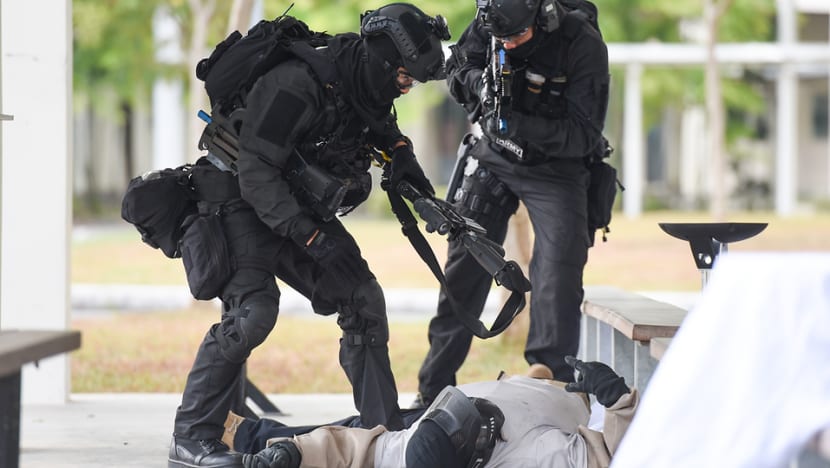Fight against terrorism 'far from over' 20 years after 9/11, says PM Lee

Singapore's Special Operations Task Force (SOTF) troopers securing the area after neutralising a terrorist threat during a counter-terrorism operation demonstration. (Photo: Ngau Kai Yan)
SINGAPORE: The fight against terrorism is "far from over" two decades after 9/11, Prime Minister Lee Hsien Loong has said in a commentary published on the 20th anniversary of the Al-Qaeda attacks in the United States.
"Extremist terrorism has metastasized. Digital media has amplified the poison," said Mr Lee.
"Al-Qaeda was succeeded by ISIS, which has lost physical territory but continues to operate, including online. Lone-wolf attackers have self-radicalised on the internet."
Mr Lee highlighted how this year in Singapore, the authorities arrested two self-radicalised Singaporean youths who were preparing lone-wolf attacks – one on a synagogue, the other on a mosque.
"And now that the US has left Afghanistan, we will have to watch closely how the situation there develops, whether groups based in Afghanistan will again threaten our security, and where else new fronts of terrorism may emerge," he said.
At the same time, Singapore's racial harmony is still a work in progress, said Mr Lee.
"9/11 showed how powerful are the forces that can pull us apart, and how careful we must be when making any changes to the formula that has delivered racial and religious harmony for Singapore," wrote the Prime Minister.
"Never assume we have overcome for good the tendency of people to identify with their own racial and religious groups. We have to keep on bringing all the communities closer together, and from time to time adjust the delicate balance that the different communities have reached."
"WATCHED IN HORROR"
Mr Lee recounted in the commentary how he was informed by Professor S Jayakumar, then Minister for Foreign Affairs, about the attack in 2001.
"I turned on the television to see the two towers in flames, and watched in horror later as they collapsed one after the other. Our world changed overnight," he said, referring to the World Trade Centre in New York.
Soon after, Singapore discovered a terrorist organisation with a common ideology and direct links with Al-Qaeda in Afghanistan – the Jemaah Islamiyah (JI) group.
On Sep 11, 2001 , JI members were already in advanced planning for simultaneous truck bomb attacks on multiple targets in Singapore, including the US Embassy and other Western interests, but they were foiled in time by the Internal Security Department (ISD), said Mr Lee.
Internationally, Singapore cooperated with other countries to share intelligence and to "fight a common scourge". The Singapore Armed Forces participated in the International Security Assistance Force in Afghanistan, and contributed to the Global Coalition to Defeat ISIS in Iraq.
"Terrorist groups in these faraway places were serious threats to Singapore," he said.
But terrorism was a greater threat to the country's mutual trust and social cohesion, said Mr Lee.
SINGAPOREANS "INSTINCTIVELY PULLED TOGETHER"
In the face of such extremism, and especially after several Singaporean members of the JI were detained, non-Muslims in Singapore could easily have become fearful and suspicious of their Muslim neighbours, colleagues and friends, Mr Lee said.
Muslims in turn, feeling distrusted and threatened, could have closed in on themselves.
"We would have been divided by race and religion. And if an attack had actually taken place here, our society could have been torn apart."
Instead, Singaporeans "instinctively pulled together", and responded strongly and cohesively to keep themselves safe, said Mr Lee.
Community and religious leaders from all groups and faiths came out to condemn the terrorist attacks, and stood in solidarity with one another.
"In particular, Muslim leaders were forthright in repudiating the terrorists, and they guided the community on the true teachings of Islam. Non-Muslim leaders too spoke up in support of religious tolerance and to express confidence in their fellow Singaporeans," he said.
The Government held open discussions with leaders of all groups and closed door briefings to the key leaders, to share with them sensitive intelligence and threat assessments.
At the grassroots level, Inter-Racial and Religious Confidence Circles were organised all over Singapore. These local networks of leaders were meant to manage any racial and religious tensions after a terrorist attack.
Singapore also sought to rehabilitate those led astray by the violent extremist ideology, said Mr Lee.
"ETERNAL VIGILENCE"
"Because we did all this, our racial and religious harmony held, and indeed strengthened. This was vital, as the threat was real and continuing, said Mr Lee, as he listed attacks and threats in the years since, including the Bali bombings, attacks in Jakarta, Kuala Lumpur and Bangkok, and the siege of Marawi in Southern Philippines.
Singapore, too, remains a prime target, he said. More than once, terrorists planned attacks on Singapore, including one to hijack and crash an airliner into the Changi Airport control tower, and another to launch rockets at Marina Bay Sands from Batam.
"The price of security is eternal vigilance. The price of harmony is an unflagging effort to uphold and realise ever more fully our nation’s founding ideal to become one people, regardless of race, language, or religion," said Mr Lee.
"Singaporeans’ shared experience of 9/11 and its aftermath is another formative chapter in our nation building journey. On its 20th anniversary, let us resolve to fortify ourselves so that should we ever face another such test one day, we will come through again, stronger, as one united people."
THE 9/11 TERROR ATTACKS
The Al-Qaeda plane hijackings of September 11, 2001 were the first foreign attack on the US mainland in nearly two centuries.
The Islamist extremists smashed two jetliners into New York's World Trade Center, killing 2,753 people.
A third commercial jet hit the Pentagon, killing 184, and 40 more died after a fourth plane crashed into a field in Shanksville, Pennsylvania after a passenger revolt.
The attack plunged the West into war in Afghanistan - a military operation that has only just finished, with the Taliban back in power.
On Saturday, solemn ceremonies will be held at Ground Zero in New York and the other places of attack, overshadowed this year by the US's chaotic exit from Afghanistan.
















